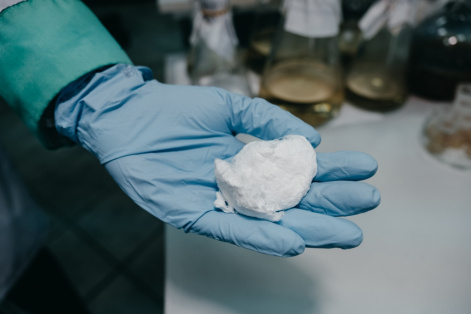Biodegradable plastic can be made from sugar beet
20 June 2022 г.

One of the modern environmental trends is the development and gradual transition to new biodegradable polymeric materials that can decompose in the environment without the formation of toxic products. These include, for example, polymers of hydroxyalkanoic acids, polyhydroxyalkanoates (PHA), synthesized by numerous species of bacteria. The intensive application of such materials is limited by the high cost and technical difficulties of the production process. These problems can be avoided by optimizing biotechnological synthesis primarily through the application of new productive bacterial strains capable of growing on available substrates and synthesizing PHA of various chemical compositions.
A team of researchers from the Krasnoyarsk Science Center of SB RAS and Siberian Federal University developed a method for the synthesis of PHA from sugar beet molasses using a natural bacterial strain Cupriavidus necator. Despite the fact that the researchers had to further adjust the chemical composition of the molasses, they achieved an 80% polymer yield from the bacterial biomass. The results show the efficiency of the polymer synthesis from sugar industry waste.
Sugars are an excellent substrate in biotechnology and a renewable resource for the production of polymer products. The researchers used sugar beet molasses as a growth substrate for bacteria that synthesize biodegradable plastic. Polymer synthesis was carried out using a recently described bacterial strain, Cupriavidus necator. It is able to accumulate polymers with different chemical composition and characteristics in biomass. However, these bacteria are able to use only fructose and glucose.
The main sugar in molasses is disaccharide sucrose, which is inaccessible to bacterial cells. Therefore, the molasses must be further processed. Preliminary hydrolysis was carried out to convert sucrose into monosaccharides available to bacteria. As a result of processing, there appear fructose and glucose in the molasses. However, in addition to the "necessary" components, impurities can be formed that, in high concentrations, adversely affect the cell growth and biosynthesis, for example, these are nitrogen and minerals. To avoid the negative effect, the researchers diluted the resulting substrate with water and treated it with hydrogen peroxide. The treatment made it possible to reduce the content of nitrogen, calcium, iron, silicon and titanium without changing the sugar content. The next step included feeding the bacterial culture with glucose and with a compound containing phosphorus. This made it possible to improve the nutrient medium for bacteria, enhance their growth, and, accordingly, increase the polymer yield to 77–80% of the bacterial biomass.
“Production volumes of indestructible synthetic plastics, widely used in all spheres of human activity, are constantly growing. They cause large-scale environmental pollution. Biodegradable plastics from renewable and affordable resources can change the situation. These include, in particular, waste from the sugar industry. Our research is aimed at more efficient use of sugar production waste, such as cane and sugar beet molasses. It is a cheap source of carbon, containing, in addition to sugars, vitamins and a number of mineral elements. The results of our work show the possibility of synthesizing valuable polymers from beet molasses using the bacteria Cupriavidus necator. Such PHAs are biodegradable and highly biocompatible, which makes them promising materials for the 21st century and allows them to be considered as a competitor to well-known biodegradable plastics: polylactides and polyglycolides. They can be used in various fields from public utilities and agriculture to pharmacology and biomedicine. With the introduction of special substrates into a bacterial culture, it is possible to synthesize copolymers of various compositions with improved properties,” said Natalia Zhila, Candidate of Biological Sciences, a senior researcher at the Institute of Biophysics SB RAS.
Share:
